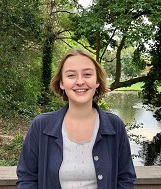Get to know the new research master students!
Fransje Bolwijn (23) and Ryohei Shiozaki (24) are two of our students of the Research Master in African Studies. Curious about their background, their motivation to do African Studies, and their career expectations for the future? Read their personal stories to get to know them better!
Fransje Bolwijn
 Tell us a bit about your background, and where does your interest in Africa come from?
Tell us a bit about your background, and where does your interest in Africa come from?
‘I did my bachelor’s in Cultural Anthropology and Development Sociology at Utrecht University. Next to the mandatory courses of my major, I chose to follow a minor in French, and multiple subjects that dealt with religion, imagery, gender and its intersections. For my BA I did research in Casablanca, Morocco and focused on young women’s ideas of femininity. I was interested in how women from 18-25 shape and embody their notions of femininity, especially in relation to their religious beliefs and the fashion choices they make.
‘During my BA I dealt with a lot of case studies from Africa and I gradually became more interested in the continent and its diversity. There is, however, a lot of history about the continent that I don’t know about yet and I would like to learn more, broaden my scope and contribute to class discussions by offering my anthropological perspective.’
Is there a specific region or theme you would like to focus on during your Research Master?
‘I’m open to all sorts of subjects, but I tend to focus on religion, identity, women, sexuality and Northern Africa. I am aware that a researcher will always be an outsider to some extent, but I hope to relate my experiences as a woman to those of other women who live in different societies and social contexts. Next to speaking English and French, I would love to acquire a basic level in another foreign language such as Dharija or Swahili. This will enable me as a researcher to communicate better with my informants and hopefully to understand them more fully.’
How do you see yourself in the future, doing what professionally?
‘I am not sure yet. Ideally I would like to work for a not-for-profit organisation or perhaps continue in research. There is still a lot I have to learn and topics and regions I would love to explore, so I want to use the next few years to find out what suits my personality and interests best.’
Ryohei Shiozaki
 Tell us a bit about your background, and where does your interest in Africa come from?
Tell us a bit about your background, and where does your interest in Africa come from?
‘I did my bachelor’s degree in Portuguese Culture and Languages at Tokyo University of Foreign Studies. At first, I wanted to focus on Brazil and Portugal. My hometown, Iwata-City in Shizuoka Prefecture, is home to a lot of Brazilians because of the car industry. Also in my class, there were a lot of Brazilian students. But unexpectedly, I was given an opportunity to do a gap year, which made me change my mind. I wanted to go somewhere really different from Japan, and I wanted to go to a Portuguese speaking country. My university already had connections with Mozambique, which made the choice easier for me.
‘Once in Mozambique, I was invited to a wedding ceremony. I was surprised about the many emotions I witnessed at this wedding: people cried, people laughed, it was an amazing experience. It contrasts a lot with Japanese society, where people don’t show emotions; it’s all about status there. Anyhow, the function of the traditional marriage ceremony in Mozambican society became the subject of my BA thesis.’
What region or theme would you like to focus on during your Research Master?
‘I would like to do more research in Mozambique and look beyond the function of the traditional marriage ceremony; I would like to focus more on the emotions of the people, from an anthropological point of view. I also met a lot of people who have a passion about what they’re doing in Mozambique. And they use their environment to achieve their goal. In Japan, you just follow the trail and the perspective that society provides. This is a big difference between the two countries.
‘I have developed a broader interest in Mozambique that I would like to explore. Perhaps later on, I will extend my focus to other Portuguese speaking countries in Africa, like Angola.’
How do you see yourself in the future, doing what professionally?
‘In the next few years I want to find out what I want to do. The Research Master gives me two years, including a considerable fieldwork period, in which I can explore if I want to continue in research, and whether I might even continue with a PhD.’

